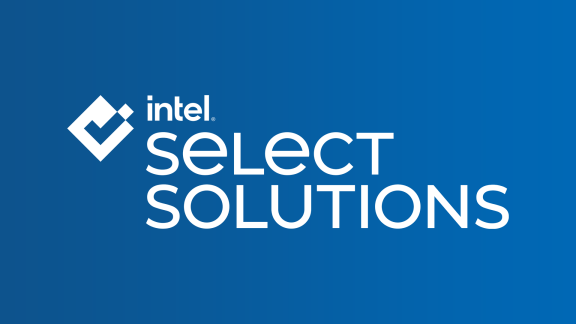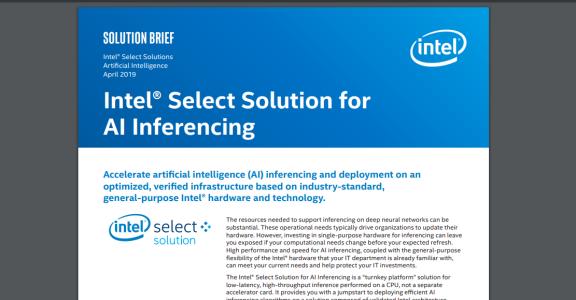Deployment of workloads of AI for cases of use of next-generation is done in an optimized environment with the help of Intel. Intel and its partners the benefits of AI to its data centers and cloud system to empower organizations to achieve more than ever before.
Artificial intelligence and machine learning offer extraordinary possibilities, which is true for every industry. With optimizations and the acceleration of artificial intelligence, the ecosystem has been built wide and deep. This helps Intel provide the much sought-after flexibility that various organizations look for when trying to create a deployment as desired.
Cloud computing has helped change the face of artificial deployments and machine learning. In collaboration with the leading cloud services, which have to their crown the tag of being innovative, Intel helps optimize the deployment of clouds everywhere. Some of these have been highlighted below:
Amazon web services and Intel

This collaboration brings broad options to users for AI workloads. The collaboration involves EC2 instances featuring DL Boost and upcoming EC2 instances powered by Habana Gaudi processors. This also has devices such as DeepLens, Deepracer, and DeepCompser.
Baidu and Intel

PaddlePaddle is the name of the open-source deep learning platform by Baidu. These run using the second generation of Intel Xeon Scalable processors and have optimizations for computation, architecture, and memory for the most efficient performance in model deployment.
Google cloud platform and intel

Google was amongst the first cloud services which offered Intel Xeon Scalable processors. It did so through the CPU selector tool it has for its users. Google Kubernetes Engine (GKE) and Google Compute Engine (GCE) use these processors to deliver high-performance and efficient AI workloads.
Microsoft Azure and Intel

Microsoft Azure can support a wide range of artificial intelligence workloads using the Intel Xeon Scalable processors. Intel collaborates with Microsoft to optimize the cloud for better computing and delivery through the cloud systems.
AI systems that are ready for Enterprises.
Intel has formed collaborations with various manufacturers of original equipment (OEMs). The purpose of this is to speed up the creation of an infrastructure that is ready with AI and can handle the deployment of workloads with complete success in all kinds of applications.
Intel powers Cisco Deployments of Artificial Intelligence.
Intel has a healthy collaboration with Intel, and they are working on accelerating and optimizing visual research and image recognition. Moreover, Intel Xeon processors play a big part in this process. Cisco has developed inference engines and purpose-designed technologies for artificial intelligence and deep learning workloads.
EMC read AI solutions by DELL
Dell and Intel aim to accelerate and simplify the deployment of artificial intelligence. From optimizing H2O.ai to empowering DataRobots by creating reference architecture, this partnership between the two giants has had immense positive impacts on the speed of deployments and their quality in sectors involving artificial intelligence.
Intel-based solutions for HPE AI
Intel has a lot of collaborations. Amongst them, the one with Hewlett Packard enterprises is particularly special for its focus on high-performance computing solutions with artificial intelligence capabilities. HPE AI, built using technology support from Intel, includes the Aurora exascale system and the high-per-computing solution in the form of service to handle CFD workloads.
Inspur AI architecture with optimizations for Intel
Inspur has created an AI inference solution and training module. These accelerators and solutions use Intel Xeon processors and FPGAs from Intel. These solutions are optimized for Intel’s hardware solutions. They have developed an artificial intelligence architecture to create optimized deep learning frameworks. This also helps in delivering budget solutions.
Intel-based AI from Lenovo
LiCO, or Lenovo Intelligent Computing Orchestration, has been developed using the best technologies from Intel. It is a massive help in simplifying the deployment of artificial intelligence for enterprises, and it has an intuitive interface that makes managing workloads of artificial intelligence intuitive.
Intel promises to help organizations create flexible computer vision solutions that match the demands of today’s applications of Edge. Intel has been providing active support o enterprises that are shifting to Edge. By powering the intelligent IoT, Intel aims to capture better data and act sooner through faster analysis.
Intel Select Solution

This latest set of solutions from Intel aims to help you skip the guesswork when it comes to deploying artificial intelligence. Simplification and acceleration in deploying deep learning and inferencing artificial intelligence using reference architecture verified based on off-the-shelf hardware.
FAQs
1. What are Intel AI solutions, and what types of problems do they address?
Intel AI solutions encompass a range of hardware, software, and services designed to accelerate the development and deployment of artificial intelligence (AI) applications across various industries. These solutions aim to address challenges related to data processing, inference, and training tasks, enabling organizations to unlock insights, improve decision-making, and enhance productivity using AI technologies.
2. What types of AI solutions does Intel offer for deployment?
Intel offers a variety of AI solutions tailored for different deployment scenarios, including:
- On-premises deployments: Solutions optimized for deployment in data centers, edge devices, and IoT (Internet of Things) devices.
- Cloud-based deployments: Solutions hosted on Intel-powered cloud platforms, providing scalability and flexibility for AI workloads.
- Hybrid deployments: Solutions that leverage a combination of on-premises and cloud resources to meet specific performance, privacy, and regulatory requirements.
3. How does Intel support organizations in deploying AI solutions?
Intel provides a range of resources, tools, and services to support organizations in deploying AI solutions effectively, including:
- Hardware platforms: Intel offers a variety of CPUs, GPUs, FPGAs, and accelerators optimized for AI workloads.
- Software frameworks: Intel collaborates with leading AI software vendors to optimize popular frameworks such as TensorFlow, PyTorch, and ONNX for Intel hardware architectures.
- Libraries and toolkits: Intel provides libraries and toolkits such as the OpenVINO Toolkit and oneAPI to optimize and deploy AI models efficiently.
- Developer resources: Intel offers documentation, tutorials, code samples, and training programs to help developers build and deploy AI solutions on Intel platforms.
- Support services: Intel provides technical support, consulting services, and partnerships with ecosystem vendors to assist organizations in deploying and maintaining AI solutions.
4. Can Intel AI solutions be customized to meet specific business requirements?
Yes, Intel AI solutions can be customized and tailored to meet the unique requirements of different industries, use cases, and organizational needs. Intel collaborates with customers and partners to develop custom solutions, optimize algorithms, and integrate AI capabilities into existing workflows, applications, and systems.
5. What are the key considerations when deploying Intel AI solutions?
Key considerations when deploying Intel AI solutions include:
- Hardware infrastructure: Selecting the appropriate Intel hardware platform based on performance, scalability, and power efficiency requirements.
- Software stack: Choosing the right combination of software frameworks, libraries, and toolkits to optimize AI workloads for Intel hardware.
- Data management: Ensuring efficient data processing, storage, and management to support AI training and inference tasks.
- Security and compliance: Implementing robust security measures and adhering to regulatory requirements to protect sensitive data and ensure compliance with privacy laws.
- Integration and scalability: Designing AI solutions that can seamlessly integrate with existing IT infrastructure and scale to accommodate growing data volumes and user demands.
6. Are Intel AI solutions suitable for both enterprise and research applications?
Yes, Intel AI solutions are suitable for a wide range of applications across various industries, including enterprise, research, academia, healthcare, finance, manufacturing, and more. Whether organizations are looking to improve business operations, drive innovation, or advance scientific research, Intel AI solutions offer scalability, performance, and flexibility to meet diverse needs.
7. How can organizations get started with deploying Intel AI solutions?
Organizations can get started with deploying Intel AI solutions by:
- Exploring the range of AI hardware, software, and services offered by Intel.
- Assessing their AI requirements and identifying use cases where AI technologies can deliver value.
- Leveraging Intel’s resources, documentation, and training programs to build expertise in AI development and deployment.
- Engaging with Intel representatives, partners, and ecosystem vendors to develop customized AI solutions tailored to their specific needs.
- Piloting and testing AI solutions in real-world scenarios to evaluate performance, scalability, and return on investment before full-scale deployment.





